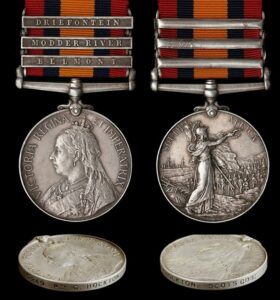Boer War medals, much sought after collectibles, have many a fascinating tale to tell!
When the Boer War erupted in 1899 between South Africa’s ex-colonial masters, the British and the Boers, the former, puffed with their military might, were so confident of routing the Boers within a year that they decided to honour their soldiers with the Queen’s South Africa medal, which the mint was ordered to produce ahead of the war’s end, inscribed with the dates 1899-1900. But the war dragged on till 1902 -–
what was to be done with the medals? Some 50 medals were awarded to Canadian soldiers who’d sailed home before 1902 after completing their war duty. As for the remaining medals, dates were obliterated; some still exist with faintly marked years, known among medal collectors as “ghost dates”!
Types of Boer War medals
The British mint used two dies to strike three versions of the Queen’s South Africa Medal. From Die 1 were struck two types of medals – one with the war dates and the other, with the dates erased.
The second die was used to strike a medal with design variations from the previous two.
In 1901, Queen Victoria died. She was succeeded by King Edward VII – and hence, the minting of the King’s South Africa Medal, with two clasps, known as South Africa 1901 and South Africa 1902. The Queen’s and King’s medals were always jointly awarded to soldiers who fought in South Africa between 1901 and 1902. Of the 3,000 Canadians awarded the Queen’s South Africa medal, 160 men also got the King’s South Africa Medal. From a collector’s perspective, a pair of these medals from a Canadian source would be a rare and valuable find.
To honour a soldier’s contribution or simply, his presence in any of the innumerable battles fought across South Africa, the British issued 26 medal clasps named after battle locations – ‘Cape Colony’, ‘Transvaal’, ‘Diamond Hill’, ‘Laing’s Nek’, etc.
Among bars, the ‘Defence of Mafeking’ – so named for a town that survived a 200-day siege – is considered the rarest of Boer war medals’. Its clasp is also a rare collectible, awarded to all the British troops in the Mafeking garrison. Serious medal collectors should verify that the medal holder is genuinely entitled to the clasp for it is this that determines its value. A Rhodesia clasp attached to a medal issued to a Canadian would be priced way higher than, for example, a Johannesburg clasp. A medal with nine authenticated clasps awarded to a Royal Navy member could be worth double the value of a similar medal issued to a British Army soldier.
If you’re interested in acquiring these rarest of Boer War medals, the mantra is –do your homework well!










